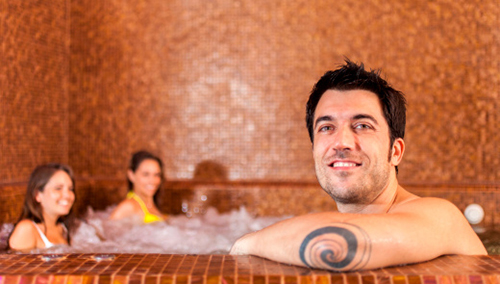英語記事に慣れる「サクっと読む英文」
2017.7.4
Bathhouses in fog about accepting people with tattoos
Read the article to find out what the government recently said about allowing people with tattoos into public baths.
タトゥーのある人々が公衆浴場を利用することに対し、政府が発表したことについて記事を読んでみましょう。

It is not unusual for people from other countries to get tattooed because of their culture or for fashion. But opposition to tattoos is still strong among Japanese bathhouse users and operators, partly for the purpose of keeping yakuza from those facilities.
A person related to the industry said, “It will take more time before people with tattoos are accepted.”
According to the Public Bath Houses Law public bathing facility operators have to refuse entry to people with infectious diseases and to prevent customers from doing anything that will foul the baths, in regard to public sanitation.
The government’s written statement said having tattoos alone does not hurt sanitation conditions, and so having tattoos is not a good enough reason to refuse customers under the law.
However, the written statement does not have any binding power. An official of the Health, Labor and Welfare Ministry said, “We leave it to the judgment of facility operators whether they allow [people with tattoos] to use their bathing facilities.”
Onyoku Shinko Kyokai, a foundation promoting hot-water bathing, completed a survey on about 1,200 bathhouse users in autumn 2015. About 130 bathhouses, including large bathhouses called “super sento,” belong to the foundation.
Among the respondents, 49% said they felt uncomfortable and 24% said they felt scared about people with tattoos.
Regarding the written statement, Toshihiro Morohoshi, chief director of the foundation, said: “Users have deep-rooted negative sentiments that mean they feel scared by people with tattoos.”
“Ofuro cafe utatane,” a public bathing facility in Kita Ward, Saitama, offers stickers, each 12.8 cm by 18.2 cm – close to the size of a comic book – allowing people to enter if they hide their tattoos with them.
Behind this decision is an increase in the number of foreign tourists as well as a growing number of young Japanese people who are getting tattoos as fashion statements.
The government’s written statement effectively authorized the facility’s measure. But Onsendojo Inc., the company operating the facility, still considers it possible that other bathers may voice feelings of fear. The facility will continue offering the stickers for the time being.
On the other hand, traditional public bathhouses for the general public – called sento – have been relatively open-minded about tattoos because those facilities are very public in nature.
“The judgment is made by each of the bathhouses,” said an official of Zenkoku Koshu Yokujogyo Seikatsu Eisei Dogyo Kumiai Rengokai, a Tokyo-based federation of public bathhouse operators focusing on public sanitation. About 60% of all sento in Japan are members of the federation.
But the official added: “Sento play the role of bathing facilities for local communities. So operators don’t refuse people only because they have tattoos. We would like to proactively accept foreign users, too.”
The number of foreign tourists coming to Japan is going up, and bathhouses and other public baths are worried. That is because the government made a written statement saying that public baths should not stop customers who have tattoos, at a Cabinet meeting in February.
Many people from other countries have tattoos because of their culture or for fashion. But many Japanese bathhouses and customers are against tattoos. They want to stop yakuza from coming to their bathhouse.
Some people think it will take more time before people are OK with tattoos.
The Public Bath Houses Law says public baths can stop people with some diseases from going into the bath. They can also stop customers who will dirty the bath.
The government said that having tattoos does not dirty the bath, so having tattoos is not a reason to stop customers from using the bath.
However, the government cannot make bathhouses follow the rule. The government will let each bathhouse choose if people with tattoos can use the bath.
Onyoku Shinko Kyokai is a group that supports hot-water baths. In autumn 2015, they asked about 1,200 bathhouse users questions about bathhouses. About 130 bathhouses (and large bathhouses called “super sento”) are part of the Onyoku Shinko Kyokai.
49% of bathhouse users said they felt uncomfortable and 24% said they felt scared about people with tattoos.
Toshihiro Morohoshi, chief director of the organization, said many customers “feel scared by people with tattoos.”
“Ofuro cafe utatane,” a public bath in Kita, Saitama, lets people cover their tattoos. The bath gives customers a 12.8 cm by 18.2 cm sheet to cover their tattoo. Then, people can go into the bath if they hide their tattoos.
More foreign tourists as well as a growing number of young Japanese people who are getting tattoos for fashion.
The government’s decision made the bathhouse’s rule possible. But Onsendojo Inc., the company that runs the bath, still thinks that other customers may feel afraid. The bath will keep letting people cover their tattoos for now.
On the other hand, sento have been pretty open-minded about tattoos because they get many customers.
“The judgment is made by each of the bathhouses,” said an official of Zenkoku Koshu Yokujogyo Seikatsu Eisei Dogyo Kumiai Rengokai, a group of Tokyo public bathhouses. This group wants to make sure baths are clean. About 60% of all sento in Japan are members of the group.
But the official added that many local communities use sento to bathe. So, many sento don’t stop people just because they have tattoos. The official said they would like foreigners to use their baths, too.
キーフレーズ
written statement 公式声明書
access (~へ入る)手段、利用する権利
ある場所へ入る手段、または利用(入場)する権利、という意味です。
例:The bank has access to all their customers’ personal information.
(銀行はすべての顧客の個人情報を入手することができる。
Cabinet meeting 閣議
get tattooed 入れ墨(タトゥー)を入れる
partly 一部は
infectious disease 感染症
foul 汚す、不潔にする
public sanitation 公衆衛生
binding power (法的)強制力・拘束力
法に基づき、ある一定の行為を制限もしくは強制する力という意味です。
例:The contract wasn’t signed, so it doesn’t have binding power.
(この契約書は署名されていないため、拘束力はありません。)
respondent 応答者
bather 入浴者
in nature 本来は、実際は
元々の気質や性質など本質的にある状態であること、または事実上・実質的にそうであることを意味します。
例:Car racing is dangerous in nature.
(自動車レースは本質的に危険である。)
proactively 積極的に
物事に対して自ら進んで働きかけ、意欲的に行動することを意味します。
例:We need to proactively address our declining sales numbers.
(私たちは、減少する売り上げに対し積極的に対処しなければならない。)


 【Gabaからのお知らせ】
【Gabaからのお知らせ】 【特集】
【特集】 【英単語の正しい使い分け】
【英単語の正しい使い分け】 【使いこなす句動詞】
【使いこなす句動詞】